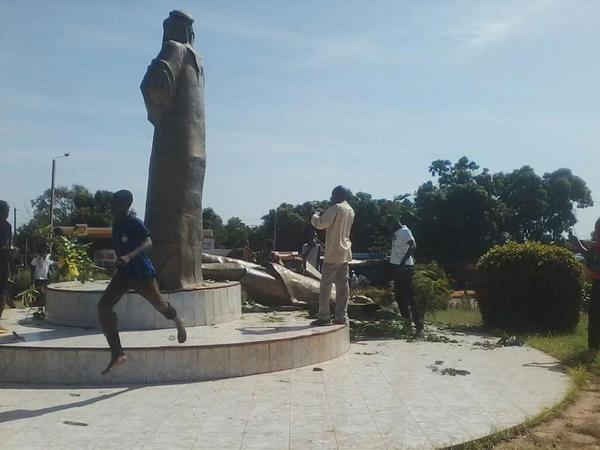
Statue of President Compaoré taken down by protesters in Bobo Dioulasso, Burkina Faso – via Edem Tchakou (with permission)
Protests have rocked Ouagadougou, the capital city of Burkina Faso, and other cities since mid-October following President Blaise Compaoré‘s proposal to revise the West African country's presidential term limits.
A president can only run for two presidential terms under the current constitution. But that constitution has been amended three times — in 1997, 2000 and 2002 — since it was approved in 1991. These amendments have allowed Compaoré to remain in power for 27 years.
The proposed revision, which is set to be voted on through a referendum this coming week, seeks to reduce the current seven-year term to five years. The proposal would reset the clock to zero (so to speak) and allow him to run three more times and, if he wins, to be president for an additional 15 years.
On October 28, tens of thousands of people marched through the capital, chanting for change mostly in a peaceful manner. Still, a few protesters toppled the president's statue located at the center of Bobo Dioulasso and police threw tear gas at the protesters in Ouagadougou.
The leader of the opposition, Zephirin Diabre, is one of the leading organizers of the protests. On October 26, he tweeted a call for people to march together:
RDV à #Ouagadougou, la protestation prendra la forme d’un rassemblement à la Place de la Nation le 28 Oct. 2014 à partir de 8 heures. #bf226 — Zéphirin Diabré (@Zephirindiabre) October 26, 2014
The protest will start with a get-together at the Place de la Nation on October 28 at 8 AM #Ouagadougou
He then added why he thought it was time for citizens to take action:
NON au tripatouillage de notre Constitution. Rejetons à jamais le pouvoir à vie ! Rejetons à jamais le coup d’Etat constitutionnel ! #bf226 — Zéphirin Diabré (@Zephirindiabre) October 26, 2014
NO to the tweaking of the constitution. We need to reject forever the concept of president for life. We must refuse the hijacking of the constitution !
The protests were widely documented and followed on Twitter via the hashtags #burkina, #bf226 and #iwili. Mossi Dramame, from the capital, posted a few images:
Peuple du Burkina, l'Afrique vous soutien,Compaoré dégage !! #BurkinaFaso pic.twitter.com/gAUwRukE6z
— Mossi Dramane (@MossiDramane) 28 Octobre 2014
People of Burkina, Africa is with you. Compaoré out ! #Burkina
Here is a snapshot of the attendance on Tuesday morning:
Marée humaine à la place de la révolution au #BurkinaFaso #iwili cc @papalioune @paddoff pic.twitter.com/dPGm0fGSHF
— Moussoukoro Diop (@mamouchkadiop) octubre 28, 2014
Human tidel wave at the Place de la Révolution in #Burkina Faso #iwili cc @papalioune @paddoff
Even if they understand the reason for the protests, some Burkinabe are unsure that civilian disobedience is the right way to go about it. Yaya Boudani reports some of those views from Ouagadougou:
Il faut choisir des voies légales pour arriver à trancher le différend entre le pouvoir et l'opposition. Il n'y a pas d'autres voies sinon une voie illégale qui va braquer les uns contre les autres. On va tomber dans une crise que personne ne peut maîtriser.
We must choose means within the rules of the law to settle this issue between the government and the opposition. There is no other way because going the illegal way will polarize the nation. The country may enter a period of crisis that nobody can control.
Observers from the neighboring countries are anxiously observing this new development in Burkina Faso. President Compaoré played a pivotal role in mediating the Ivorian crisis in 2010. Following the November 2010 presidential election, Côte d'Ivoire experienced a drawn-out governance crisis after the two opposing leaders, Laurent Gbagbo and Alassane Ouattara, both claimed victory. Protests and all-out violence marked the period from the initial standoff, as neither Gbagbo or Ouattara showed signs of backing down. Compoaré spearheaded a mediation task force to try to out a halt to the violence.
A member of the Ivorian government, Alain Lobognon, weighed in on the protest via his Twitter feed:
Chaque école politique se définit selon ses visées. La Chine est une exception démocratique. Pourquoi le Burkina ne le serait pas?
— ALAIN LOBOGNON (@ALAINLOBOG) October 27, 2014
Any political system is defined by its objectives and its context. China is an exception when it comes to democracy. Why can't Burkina Faso follow the same path?
Observers are afraid that violence might escalate soon. Reports on News Ouaga show that protests the week before were becoming more contentious:
Après des manifestations relativement pacifiques la semaine dernière à Ouagadougou, des groupes de “50 à 300″ individus “agressent” depuis dimanche des députés de la majorité devant leurs domiciles, les accusant d’être “corrompus”, “traîtres à la nation”
After relatively peaceful protests last week in Ouagadougou, groups of “50 to 300″ individuals attacked members of the parliament at their homes on Sunday, accusing them of being “corrupt” and “traitors to the nation”.







2 comments